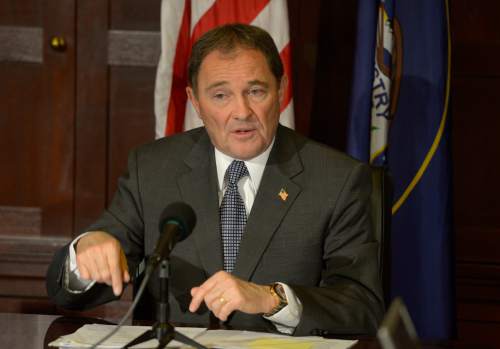This is an archived article that was published on sltrib.com in 2014, and information in the article may be outdated. It is provided only for personal research purposes and may not be reprinted.
Sandy • Gov. Gary Herbert took the unusual step Saturday to support the Utah Republican Party for suing him this week — as part of its effort to overturn a new law that changes how parties may select their nominees.
And adding to a strange day, the party said it lacks enough time to change bylaws as forced by the new law to qualify for official ballot recognition in 2016. That could force Republicans to run as unaffiliated candidates — unless the courts or Legislature delay implementation of the law.
Herbert sent an emissary — Derek Miller, his former chief of staff and current political director — to express support to the GOP State Central Committee for its lawsuit that contends the new law violates its constitutional rights to select its own nominees as it pleases.
"The governor believes that there is a legitimate, legal and constitutional question on the lawsuit, and it is appropriate for it to move forward to once and for all resolve that," Miller said.
The 100-plus delegates there cheered and shouted amid long applause.
The new law, SB54, was a compromise between the heavily Republican Legislature and governor and the Count My Vote initiative drive led by former GOP Gov. Mike Leavitt and former Democratic First Lady Norma Matheson.
Office holders wanted to preserve the current system where party convention delegates — elected at neighborhood caucuses — narrow the field of primary election candidates to two. However, if one receives 60 percent of the delegate vote or more, which often happens, he or she advances directly to the general election.
Count My Vote also proposed allowing candidates to appear on a primary ballot if they collect enough voter signatures. The group says the current system leads to low voter turnout by eliminating many primaries, and allows extremists to dominate conventions with small numbers.
SB54 allows qualifying for a primary either through a convention and/or collecting signatures, if parties so choose. But if they keep just their current caucus-convention system, the party cannot officially appear on the ballot. After SB54 passed, Count My Vote withdrew its ballot initiative as part of the compromise.
Miller told the central committee Saturday that the governor wanted him to make sure members know "he is a strong supporter of the caucus-convention system."
He added, "He believes he would not be governor today if we did not have the caucus-convention system that allowed, in his words, a regular old guy to become governor" by campaigning personally to a smaller number of delegates.
When Herbert signed SB54 earlier this year, he defended the law saying, "On balance I think it was the best thing to do for the people of Utah. This will not be a death warrant for the caucus-convention system in my view."
Utah Republican Party Chairman James Evans hailed the support coming now from Herbert.
"I think that speaks quite a bit for what we are doing. We're not out of bounds here. We're not doing something that been a takeover of the party by an extreme few. That's what they [Count My Vote] would want people to believe," he said.
Evans also said that the Republican Party itself "was never part of a compromise," and had always warned it would legally challenge SB54. So he said the party is not breaking any deals — and is trying to resolve serious constitutional questions.
But Rich McKeown, executive cochairman of Count My Vote, said, "It's our position that there already is legal clarity on these issues. The Supreme Court especially has clearly articulated the law in this area."
So he said support by the party and governor for the lawsuit simply continues efforts "to keep a small number of people determining who appears in primary elections," who may not reflect mainstream Utahns.
In a statement released Saturday evening, McKeown said on the initiative leaders' behalf that the Republican Party is "entitled to its day in court," but that they're confident that SB54 will pass judicial scrutiny.
"We expect the Utah Attorney General, and Lieutenant Governor in his role as the state's Chief Election Officer, to vigorously defend the law as they have assured us they will," McKeown wrote.
Also, Evans said party rules likely do not allow it enough time to change its constitution and bylaws to permit changes required by SB54 to appear on the 2016 ballot. So he said Republicans may appear as unaffiliated candidates, "and we would have to advertise" which ones the party actually supports.
He said party rules allow a convention with all 4,000 delegates just once a year to consider such changes. All delegates can propose alternatives, so he said it likely would be a lengthy process, and would need to be repeated by county parties.
McKeown said that sounds like a hollow excuse. "The law passed nearly a year ago, and now they are complaining. They've had plenty of time to act."
Evans insists the problems are real, and added, "I don't think that Utahns will appreciate that SB54 can very well deny a Republican to be on the ballot as a Republican," unless the courts or Legislature change that.
The Utah Democratic Party, meanwhile, has said it supports SB54.
Republicans noted some irony about where they met Saturday to discuss their SB54 fight — the Gail Miller Conference Center at a Salt Lake Community College campus in Sandy. Gail Miller, whose family owns the Utah Jazz, movie theaters and car dealerships, was co-chairwoman of Count My Vote.



